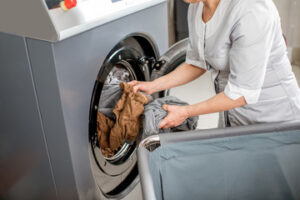Laundry is a time-consuming chore that can feel tedious. Modern Laundry of Windsor spaces combine function and design to make the process more enjoyable.
Efficient smart appliances minimize energy usage and offer convenient features like remote monitoring. They can even run cycles during off-peak energy hours to save on utility bills.
Add a pop of color to a modern laundry room with herringbone-patterned tile. Dark cabinet colors also pack a design punch.
1. Functionality

Modern Laundry is more than just a trendy design trend—it’s an essential part of any home. A well-designed laundry room provides the space to perform a variety of tasks and enhances the overall aesthetics of a home. Here are a few tips to help you create a modern laundry room that meets the needs of your family.
Design your laundry to accommodate the workflow of washing, drying, and folding clothes. Using the right materials, colors, and designs will make this hardworking room both beautiful and functional. For a modern look, opt for a neutral color scheme that will complement a wide range of palettes and design styles. This color scheme will also be easy to clean, and it won’t limit you if you ever want to repaint or change out cabinetry.
Choosing high-efficiency washers and dryers is an excellent way to save money on energy bills and minimize your environmental impact. These appliances use less water and electricity compared to traditional models, while offering features like customizable wash cycles for different fabric types and soil levels. This allows you to wash your clothes with optimal care, extending their lifespan and protecting your clothing quality.
A key aspect of modern laundry is ensuring that all your supplies are within reach. This includes the detergents, fabric softeners, and other cleaning products. Having plenty of storage in your laundry will reduce clutter and make it easier to find what you need. Opt for a combination of open and closed storage to keep everything from dirty laundry to pet toys and supplies organized.
For a modern laundry room with a bit of industrial flair, incorporate a pipe-style drying rack to maximize space and efficiency. This can be used to hang clothes to air dry or to steam, and it’s a great way to add personality to the space.
Adding a professional stain and odor removal service is a great way to simplify your laundry routine and reduce the amount of time spent doing chores. These services can get rid of tough stains and unpleasant smells, leaving your clothes fresh and clean. They can even be arranged to fit your schedule so you don’t have to leave the comfort of your home.
2. Design
Laundry rooms are often overlooked when it comes to design, but a well-planned modern laundry can elevate this utilitarian space to something much more. This is especially true in open concept homes, where the laundry can be easily integrated into living areas through seamless finishes and soundproofing. The best laundry designs offer hidden functionality and considered decor to make this hard-working space a pleasant place to spend time.
Smart laundry designs maximize workflow efficiency by arranging appliances in ways that streamlines the process. Moreira recommends positioning washers and dryers side by side or stacked to save floor space; including spaces for sorting, pre-treating stains, hanging clothes and folding; and incorporating a countertop or sink for sorting and soaking. These hard-working laundry spaces also include ample storage for hampers, rolling baskets and cleaning products.
Modern laundry spaces can benefit from a pop of color that adds interest and personality to this confined area. A geometric wallpaper, for example, can brighten a dark laundry room and complements clean white cabinetry for a sleek look. Paint is another easy way to introduce a bold look, and a bright or dark hue can instantly update a dull laundry.
Lighting blends utility and design in a modern laundry, with pendants, wall sconces or LED strips adding interest to the ceiling. Light colors and neutral shades are popular in laundry rooms, but high-impact options like rich reds and blues can also be used as statement pieces. A patterned or textured backsplash or tile floor also creates visual intrigue, bringing a sense of luxury to the utilitarian space.
Hardware also acts as an accessory, elevating contemporary laundry decor and tying together all the functional elements of a space. A coordinating metal finish can amplify the look of a light fixture, taps or door handles while maintaining a cohesive and polished design. Incorporating unique or artisanal hardware can also introduce a sense of personalisation to a modern laundry without disrupting the overall design.
Decorative elements can also add character to modern laundry spaces, with pretty woven baskets and glass canisters a wonderful choice. Decorative items can even add visual interest to a blank wall of closed cabinetry, and greenery can bring a natural element that improves air quality and brings a fresh feel to the utilitarian space.
3. Convenience
Modern laundry services cater to busy lifestyles by eliminating the need for time-consuming laundry work. They offer on-demand and subscription options, allowing consumers to schedule laundry services at their convenience. This frees up time that can be better spent on other tasks or on leisure activities. In addition, many of these services use environmentally conscious practices and energy-efficient machines to reduce the environmental impact of their operations. This appeals to an increasingly environmentally-aware segment of the population.
Laundry services also provide superior cleaning results than can be achieved using consumer-grade appliances. Their experienced staff know how to handle a wide variety of fabrics, and they employ the best cleaning techniques to protect garments from damage and shrinkage. They can also handle delicate or high-stress items, such as knitwear, sports apparel, and lingerie.
When choosing a laundry service, make sure they prioritize reliability and customer support. They should have a solid track record of meeting promised delivery times and returning clean, undamaged clothes. In addition, they should be affordable and able to accommodate special requests or accommodations.
To streamline the payment process, many laundry services now offer mobile-based payment systems that eliminate the need for bulky coin-operated units. These apps allow users to pay for services and receive cycle monitoring and end-of-cycle alerts. They can also integrate with property management software, such as FMB Laundry’s Clothesline QuickView, enabling managers to oversee machine usage remotely.
Maximize storage space and add visual interest to a laundry room with a pipe-style drying rail. This wall feature provides space for clothing and linens to hang dry or be steamed and utilizes vertical space that would otherwise go unused. Complement the industrial look with a decorative wallpaper featuring a fun pattern or bright colors to infuse the space with personality.
Neutral colors are a great choice for a laundry room as they can be easily repainted or refreshed when the mood strikes. They also blend well with a variety of design styles, making them ideal for both contemporary and traditional spaces. For an added touch of elegance, consider adding classic beadboard wainscoting to your laundry space.
4. Energy Efficiency
High-capacity laundry appliances are a popular solution for busy households looking to wash larger loads of laundry less frequently, thus cutting down on electricity usage and cost. Energy-efficient washers and dryers can also help reduce environmental impact by minimizing waste from fabric softener, bleach, and other consumables. These appliances often come with automatic dispensers for these products, optimizing their usage and preventing overconsumption.
Energy-efficient machines can also cut down on the amount of microplastics that are shed during the washing process and flushed into waterways, a major threat to biodiversity. Look for appliances that have been ENERGY STAR rated, which means they meet strict energy efficiency guidelines set by the U.S. EPA and may qualify for rebates and incentives from your energy provider, mitigating initial costs.
Many modern laundry appliances have built-in sensors that adjust water usage and cycle duration based on load size, further decreasing energy and water consumption. You can also make the most of these appliances’ energy efficiency by using cold water for laundry whenever possible. Since a large portion of electrical demand for laundry occurs from heating water, this can add significant savings. If your energy provider offers time-of-use rates and schedules, you can further increase savings by running your laundry during off-peak hours when prices are lowest.
In addition to reducing overall electricity consumption, you can make your laundry routine even more eco-friendly by switching to non-toxic, biodegradable detergents that are free from phosphates and chlorine. You can further cut down on power use and greenhouse emissions by drying your clothes outdoors when weather permits or using energy-efficient dryers that spin at lower temperatures to dry clothing faster. Finally, you can further minimize your energy and water usage by reusing and maximizing the lifespan of your washer and dryer. This can reduce the frequency of replacements and maintenance needs, further reducing operating costs over the lifecycle of your machines.



